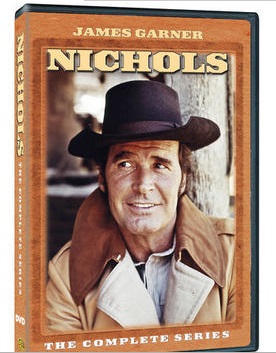For 24 episodes, between September of 1971 and March of 1972, James Garner returned to the television Western a full ten-years after leaving “Maverick,” the Western series that made him a star. “Nichols” was something entirely different, though, which is probably why it only lasted a single season. Two years later Garner would get his groove back in a major way with “The Rockford Files.” And for over forty years, “Nichols” would remain unseen and become something of a Holy Grail among Garner fans like myself.

Thanks to the Warner Archives, the Holy Grail has been found. All 24 episodes of “Nichols” are now available in a single DVD release, and this review will be of the first ten.
Let me start by saying that this set is a must-buy for James Garner fans. “Nichols” is very well-produced, acted, directed, and written. But if you are looking for another incarnation of Rockford or Maverick, you will be disappointed.
Set in Arizona circa 1914, Garner plays Nichols (no first name is ever given), a career military man who abruptly quits the army after getting fed up with the violence. He heads home to the town of Nichols, which is named after his family, the town’s founders. Much has changed over nearly two decades. The town might still be called Nichols, but its run by the Ketchams, a family that operates as a gang.
In the premiere episode, the matriarch of the gang, “Ma” Ketcham, shanghais Nichols into becoming the town’s sheriff, which is okay with him. Since the Ketchams run the town, it is a mostly symbolic post that will pay him an easy salary until he can figure out a way to make a quick fortune.
For the next nine episodes, Nichols usually finds himself up against Ketcham, Ma’s not very bright bully of a son played beautifully by John Beck. Other episodes revolve around the complications that arise when a visitor comes to town or when Nichols thinks he has found himself a get-rich-quick scheme.
One of the primary differences between Nichols and Garner’s two other iconic television characters, is that Nichols is a very passive guy. It is not so much that he is a sheriff who refuses to carry a gun, but that he seldom drives the action. Nichols doesn’t move events as much as he reacts to them. In the end, Nichols is usually the problem solver, but unlike Rockford and Maverick, Nichols is usually hoping to escape the situation or that it will resolve itself.
After the first two episodes (which were way too critical of the American military), “Nichols” wisely backs away from the partisan political messaging that landed like a thud and settles into an easy-going groove that is wonderfully unpredictable in both plot and politics. The highest compliment I can give “Nichols” is that it is not formulaic. Wildly different things happen in most every episode, and the pleasure is of course watching a brilliant actor like James Garner deal with it.
I’m definitely looking forward to the remaining 14 episodes.
If nothing else, “Nichols” ended up being a dry run for “Rockford.” Garner produced “Nichols” through his own Cherokee productions, promoted his agent Meta Rosenberg to executive producer, discovered the writing talent of Juanita Bartlett, and hired Stuart Margolin to play his deputy. These forces would all combine (with Roy Huggins and Stephen J. Cannell) just a few years later to stuff lightning in a bottle.
‘Nichols: The Complete Series’ is available at the Warner Archives.
COMMENTS
Please let us know if you're having issues with commenting.